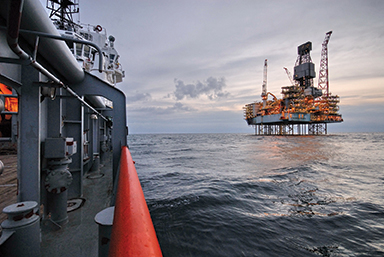The Caspian basin has historically been at the centre of production and trade cultures of Central Asia, Iran, the Caucasus and the Volga region. It has formed an important link in the magnificent Silk Road culture that connects Eastern countries and Europe. Today, the basin is an important player in the world economy, with annual economic output of $2.5 trillion.

The Caspian Sea creates advantages for Azerbaijan to build and develop economic ties through the maritime economy between the Volga, Trans-Caucasus, North Caucasus, Central Asia and Iran. The favourable geographical position, rich biological resources, oil, natural gas, phosphorite, salt, iodine, and bromine reserves, as well as sanatorium and recreation opportunities of the coastal regions, provides a solid economic, strategic, social and environmental importance of Caspian Sea for Azerbaijan.
The role of the Caspian Sea in the economy of Azerbaijan is undoubtedly primarily related to its hydrocarbon deposits and development. Industrial oil production in Azerbaijan began in the 19th century. The oil pumped from a well drilled in the “Bibiheybat” field in Baku in 1848 laid the foundation for the industrial extraction of “black gold” in Azerbaijan. Azerbaijan ranked first in the world in oil production and refining, accounting for half of world oil production in 1899. During World War II, Azerbaijan accounted for 75 percent of oil production in the Soviet Union. In 1949, the oil fountain in the then rare Oil Rocks marked the beginning of a new phase of offshore oil production 100 kilometres from Baku and Azerbaijan was the first in the world to start offshore oil production.
Intensive organization and implementation of planned geological exploration work in the Caspian Sea since the early 1970s is one of the unparalleled historical gifts of the National Leader of the Azerbaijani people, Heydar Aliyev. Today, his farsighted plans with such projects has enabled Azerbaijan’s independence and prosperity.
The oil agreement, called “The Contract of the Century”, was signed with Western oil companies on September 20, 1994 in Baku. It opened a glorious page in the new history of Azerbaijan, providing basis of exploration, development and production sharing of the “Azeri”, “Chirag” and “Guneshli” fields in the Azerbaijani sector of the Caspian Sea. In total 32 agree-ments were signed with 41 oil companies from 19 countries. The total investment portfolio is about $60 billion dollars under these agreements.
The launch of the Baku-Tbilisi-Ceyhan export oil pipeline in 2006 and the Baku-Tbilisi-Erzurum gas pipeline in 2007 significantly strengthened the country’s role in the world energy markets. The discovery of large gas fields – the “Umid” and “Absheron” fields are some of the greatest achievements of the industry. The probable reserves of the “Absheron” field are about 350 billion cubic meters of gas, which adds to Azerbaijan’s proven gas reserves that have reached 2 trillion 550 billion cubic meters.
In September 2014, the foundation of the “Southern” Gas Corridor project was laid at the Sangachal terminal. Today, full-scale development of the Shah Deniz gas condensate field, expansion of the South Caucasus Pipeline (SCP), Trans-Anatolian Pipeline (TANAP) and Trans-Adriatic Pipeline (TAP) are in place to ensure the operation of the Southern Gas Corridor in connection with the transportation of Azerbaijani gas to the world market. Furthermore, significant work has been completed on three elements of the corridor, consisting of four major projects – development of the “Shah Deniz-2” gas field, the South Caucasus Pipeline and the TANAP pro-ject.
In 2017, an Amended Production Sharing Agreement (PSA) for the development of the “Azeri-Chirag-Guneshli” (ACG) block was signed in Baku which extends the “Contract of the Cen-tury “ until 2050.
The Caspian Sea is connected to the Black Sea by the Don and Volga rivers, which means Azerbaijan is a crucial connecting country between Asia and Europe. Therefore, an important part of the East-West transport network is the sea routes passing through the Caspian Sea. The Caspian Sea determines the international importance of the Baku-Alat port, allowing the development of maritime transport with Russia, Central Asian countries and Iran. This port is the most strategic part of Azerbaijan’s logistics infrastructure and is the key point of the logistics corridor, which provides for the transportation of raw materials and finished products from China and Central Asia to Western markets. Characterised by its depth, and never freezing nature, this port will be of great importance to the countries of the Black Sea, the Middle East, Europe and Southeast Asia in the future. A large shipyard has been built in Azerbaijan in recent years to capitalise on this: The Alat International Sea Trade Port in the Caspian Basin is now in operation. Similarly, the Baku -Tbilisi-Kars railway has been constructed.
For a long time, determining the legal status of the Caspian Sea has been a decisive factor for the wider use of its economic potential. The Convention on the Legal Status of the Caspi-an Sea, signed in Aktau in August, 2018, is the only such document agreed upon by all Caspian littoral states. According to the document, each country with a coastline in the Caspian Sea has a share in the upper sea up to 15 miles from the shore, and the right to fish 10 miles from the shore. The rest of the sea is kept in common use. One of the important points of the Convention is that Article 14 establishes the right of the littoral states to build main pipelines from the bottom of the Caspian Sea by mutual consent. It also creates a legal basis for the future realisation of the Trans-Caspian pipelines, which are important for the strategic interests of Azerbaijan.
Prof. Adalat Muradov
UNEC, rector
